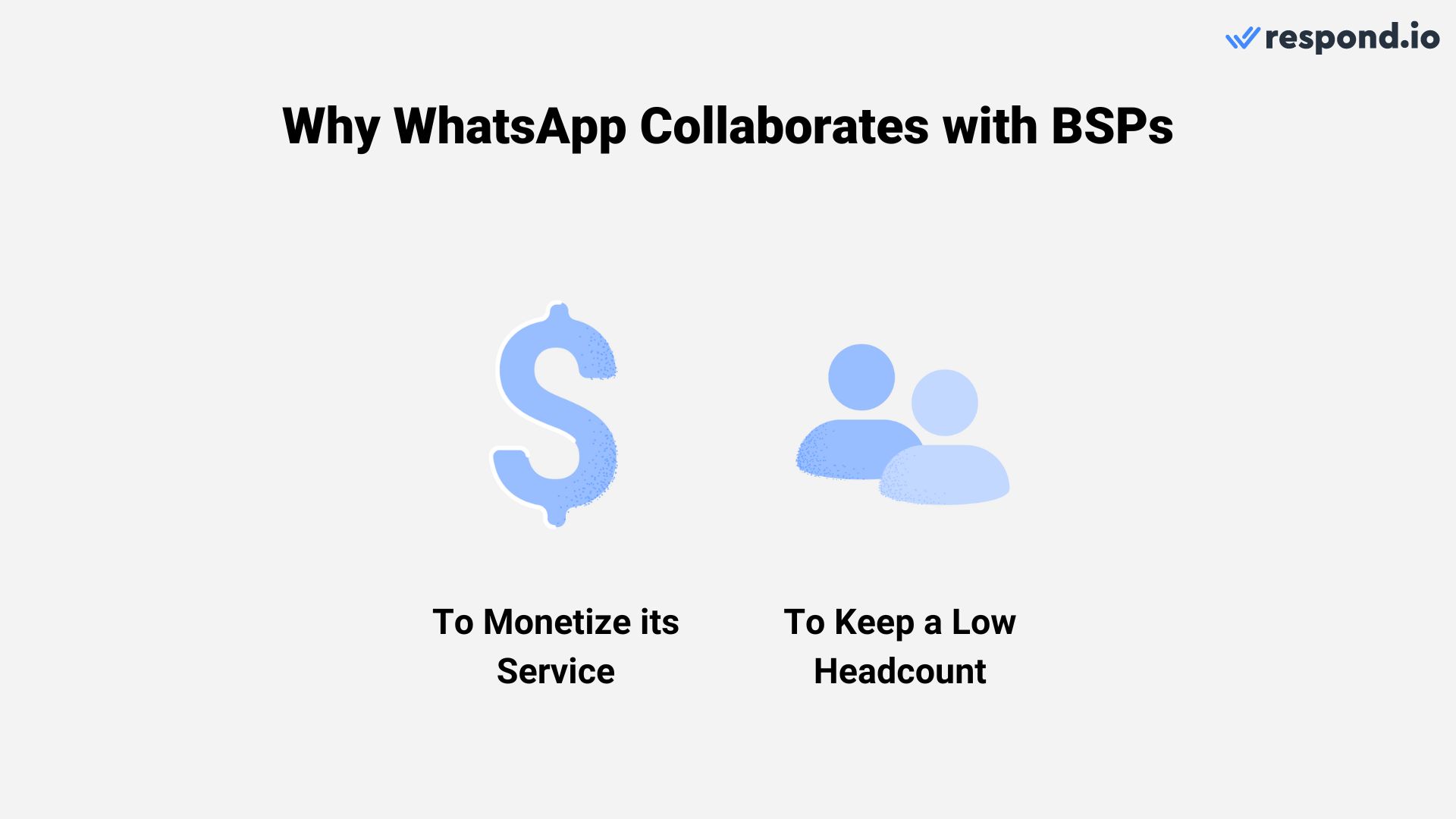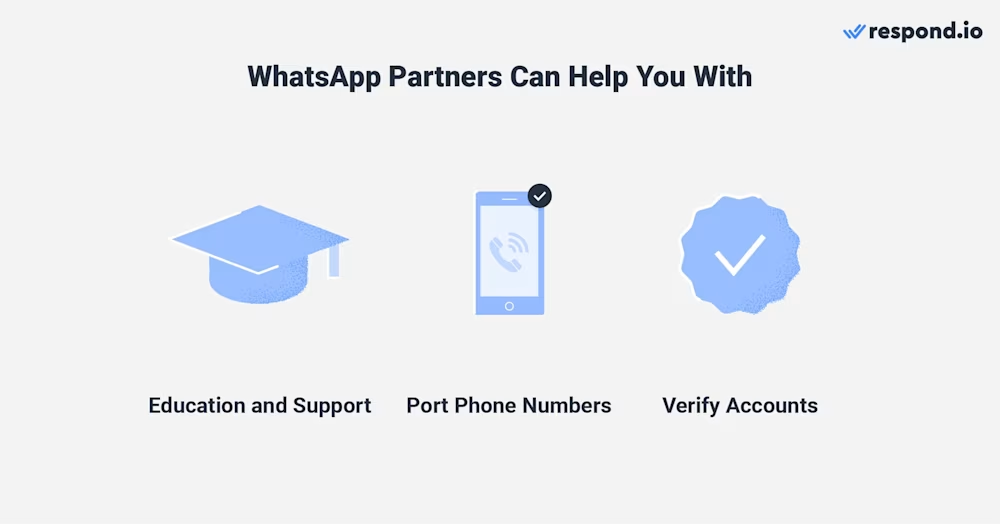

TL;DR – What is a WhatsApp BSP
Understand what a WhatsApp Business Solution Provider is and what to look for when choosing one.
What they do: A BSP acts as a middleman, handling the technical setup and providing a platform to manage customer conversations, since Meta doesn't offer a direct interface for the API.
Features:
Look for a platform with features for business growth.
Pricing:
Some providers charge extra fees, so look for a BSP with transparent pricing.
Support:
Choose a provider that offers reliable customer support.
Flexibility:
Be aware of providers that may lock you into a custom platform or make it difficult to switch later.
What is a WhatsApp Business Solution Provider?
WhatsApp Business Solution Providers are third-party companies that help you get access to the WhatsApp API. They are approved by Meta and provide solutions to enable businesses to send messages, manage customer interactions and integrate with other business tools.
WhatsApp BSPs are sometimes referred to as “WhatsApp Partners” or “WhatsApp Business Service Providers.” However, Meta officially calls them “WhatsApp Business Solution Providers.” It’s helpful to know this in case you encounter different terms online—they all refer to the same type of provider.
Why Does WhatsApp Work with WhatsApp Partners?

Before 2022, businesses could only apply for a WhatsApp API account through a WhatsApp BSP. WhatsApp's decision not to offer its API directly to most companies stems from two priorities.
The first one was profitability. After Meta acquired WhatsApp for $19 billion, the company pledged never to have ads on WhatsApp, so it needed a different business model. The solution was the WhatsApp Business API.
The second priority was to keep a low headcount. Despite being acquired for a high price, WhatsApp only had about 35 engineers back then. Outsourcing the process to partners is less resource-intensive and more cost-effective as it eliminates the need to hire additional employees.
Next, we’ll give you a quick overview of the different types of integrations made available by WhatsApp Business Solution Providers.
How Does a WhatsApp BSP Work?
Today, businesses can access the WhatsApp API in two ways:
Directly through Meta: A straightforward path to access it.
Through a WhatsApp Business Solution Provider (BSP): A preferred option for many businesses.
So, why choose a BSP? The reason is simple: BSPs continue to provide value in different ways. Let’s explore what makes them still relevant.
Turn conversations into customers with respond.io's official WhatsApp API ✨
Manage WhatsApp calls and chats in one place!
Do BSPs Offer Any Real Advantage Over Native WhatsApp Business API?

Meta is building WhatsApp into the primary channel for business-customer communication, and Business Solution Providers (BSPs) are essential to that vision. These partners help businesses connect with customers more effectively by offering tailored solutions on the WhatsApp Business Platform.
Choosing a BSP is the easiest way to get started with the WhatsApp Business API. Instead of managing everything yourself through the native setup, a BSP can guide you through the process, handle technical steps, and provide tools and support that save time and reduce complexity.
Here’s what BSPs can help you with — and why partnering with the right one makes a big difference.
Education and Support
Guide you through every step of the WhatsApp API setup, from onboarding to launch
Help you understand complex messaging rules, including business-initiated messaging limits
Keep you updated on evolving WhatsApp policies and pricing changes
Offer bundled messaging software, so you don’t need to integrate a separate inbox
Provide customer support to troubleshoot issues and optimize your setup
Port Phone Numbers
Assist with porting your existing number — mobile, landline, or toll-free — into the WhatsApp API
Offer alternatives like using WhatsApp-provided virtual numbers, if preferred
Ensure minimal downtime during number migration so you don’t lose conversations or contacts
Verify Accounts
Handle the WhatsApp Business API account verification process on your behalf
Help you obtain the WhatsApp Green Tick if eligible
Ensure your business profile is compliant and optimized for customer trust
How Much Does a WhatsApp BSP Cost?
Before choosing a BSP, don’t forget to review their pricing model. Some charge additional markups or platform fees, while others, like respond.io, offer transparent pricing with no message markups — you pay only what Meta charges.
In other words, not all WhatsApp Business Solution Providers (BSPs) price their services the same way. Here’s what to watch for.
Setup and Platform Fees
Certain BSPs charge a one-time setup fee to get started. Most require you to use their platform, which may include a messaging inbox, automation, and reports. These platform features are helpful but often come with extra costs, and opting out usually isn’t an option.
Hosting Fees
Some BSPs charge a monthly hosting fee for each WhatsApp Business account (WABA) or phone number connected to the WhatsApp Business Platform. This fee covers the cost of maintaining your WhatsApp number on Meta’s servers via the BSP’s infrastructure.
Message Markups
Some BSPs add extra charges on top of WhatsApp’s official messaging fees. These markups vary, so check if you're paying more than necessary.
How to Avoid Hidden Costs?
Look for BSPs with clear, transparent pricing listed on their website.
Avoid providers that hide fees or charge for features you don’t need.
Tip: Platforms like respond.io offer WhatsApp API access with no message markups — you pay only what Meta charges.
Complex Onboarding
Some providers ask for a lot of business information before granting access. This can delay setup or feel unnecessarily complicated.
Next, we’ll look at usage limitations some BSPs may impose.
What are Common WhatsApp Business Solution Provider Restrictions?
While WhatsApp partners help businesses get API access, some may come with limitations that can affect flexibility and long-term scalability.
Limited Feature Access
Some BSPs use their own custom version of the WhatsApp API. This can delay access to new WhatsApp features or make them completely unavailable.
Custom Platform or CRM
Many BSPs bundle the API with their own messaging platform or built-in CRM. In some cases, this can limit your ability to integrate with third-party CRMs like Salesforce or HubSpot.
Your BSP shouldn’t restrict your freedom to integrate with your existing software. Plus, you may end up paying for features you don’t need if you're already using another system.
Switching Providers Isn’t Always Simple
Migrating your WhatsApp number to another BSP is possible but comes with conditions. For example, both BSPs must be under the same Facebook Business Manager ID. Sadly, some businesses only discover these restrictions after signing up, making it hard to switch.
Tip: Before committing, ensure the BSP supports the features, tools, and integrations your business actually needs.
How to Choose a WhatsApp BSP?
The key factors to consider when choosing a BSP are reliability, features and pricing — and getting them right from the start can save you time, money and future headaches. In our article 5 Best WhatsApp Business Solution Providers, we break down these factors and compare the most popular BSPs side by side.
While many platforms work well for small businesses at first, they often fall short as you grow — whether it's due to limited automation, lack of support for other channels, or unstable infrastructure. Migrating later can be costly and disruptive.
That’s why choosing a scalable, full-featured platform like respond.io from day one is a smart move. Here are some of the benefits.
Robust WhatsApp API features
Powerful AI Agent and automation
Early access to new features like WhatsApp Business Calling API
Native integrations with CRMs like Hubspot and Salesforce
Transparent pricing - pay only what Meta charges you - and plans that scale with you
24/5 live human support and AI support on weekends
Start your journey with a free respond.io trial and see the difference for yourself.
Turn conversations into customers with respond.io's official WhatsApp API ✨
Manage WhatsApp calls and chats in one place!
Frequently Asked Questions
Can I have a WhatsApp Business API BSP list?
Yes! You can find the official list of Meta-approved WhatsApp Business Solution Providers (BSPs) on the Meta Partners Directory. These BSPs help businesses get access to the WhatsApp Business API, offer onboarding support, and often bundle it with extra tools like a messaging inbox, automation, and CRM integrations.
What is the best WhatsApp Business Solution Provider?
The best WhatsApp BSP depends on your business needs. For growing teams that want an all-in-one solution with team inbox, automation, AI, and CRM integrations, respond.io is a top-rated choice. It offers direct access to the WhatsApp API with no message markups or hidden fees, so you only pay what Meta charges.
What's the cheapest WhatsApp BSP for small businesses?
The most affordable BSPs are the ones that don’t add extra charges to Meta’s pricing. Respond.io is one of the cheapest options for small businesses, as it doesn’t charge message markups. You pay only for the messages you send, based on WhatsApp’s official rates.
What is the best WhatsApp API provider for startups?
For startups looking for flexibility, fast setup, and cost efficiency, respond.io is an excellent choice. It offers WhatsApp Business API access with powerful automation, integrations, and multi-user support—without extra fees or complicated pricing tiers. You can get started in minutes and scale as your business grows.
How do BSPs differ in AI capabilities?
Not all BSPs provide AI. Some offer basic chatbots only. Platforms like respond.io provide advanced AI Agents that can:
Qualify leads
Understand images, PDFs and files
Update contact records and lifecycle stages
Follow up automatically
Close conversations with summaries
Respond.io’s AI also runs more efficiently thanks to step-based processing, which reduces errors and unnecessary computation. And when a human joins the conversation, instant takeover ensures the AI stops immediately, preventing any message overlap.
Further Reading
You’ve made it to the end! That’s everything you need to know about WhatsApp API costs. If you enjoyed this article and you'd like to learn more about WhatsApp Business, here are some additional readings...






































 Electronics
Electronics Fashion & Apparel
Fashion & Apparel Furniture
Furniture Jewelry and Watches
Jewelry and Watches
 Afterschool Activities
Afterschool Activities Sport & Fitness
Sport & Fitness
 Beauty Center
Beauty Center Dental Clinic
Dental Clinic Medical Clinic
Medical Clinic
 Home Cleaning & Maid Services
Home Cleaning & Maid Services Photography & Videography
Photography & Videography
 Car Dealership
Car Dealership
 Travel Agency & Tour Operator
Travel Agency & Tour Operator




